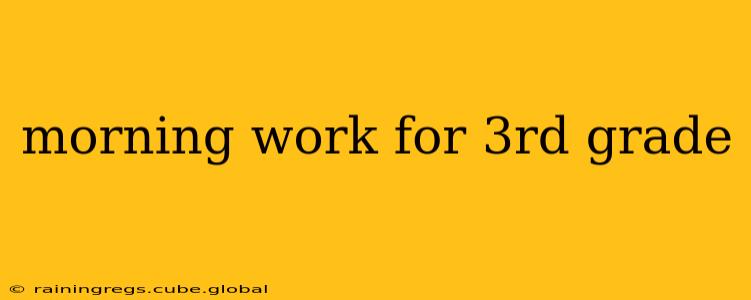Morning work in 3rd grade isn't just busy work; it's a crucial opportunity to reinforce learned skills, introduce new concepts, and establish a focused learning environment. This carefully crafted routine can significantly impact student achievement and classroom dynamics. This guide offers ideas to create engaging and effective morning work that keeps your 3rd graders sharp and ready to learn.
What Makes Effective 3rd Grade Morning Work?
Effective morning work for 3rd graders strikes a balance between review, skill-building, and a touch of fun. It should:
- Be brief and manageable: Aim for 10-15 minutes, avoiding overwhelming students before the day's main lessons begin.
- Target specific skills: Focus on areas where students need reinforcement, such as phonics, grammar, math facts, or reading comprehension.
- Be engaging and varied: Avoid monotony by rotating activities and incorporating diverse learning styles. Puzzles, games, and creative tasks can maintain student interest.
- Offer immediate feedback: Self-checking activities or answer keys allow students to assess their work and identify areas for improvement independently.
- Promote independence: Students should be able to complete the work largely on their own, freeing you to manage classroom routines.
Types of Morning Work Activities for 3rd Graders
Here are some engaging activities to incorporate into your 3rd-grade morning work routine:
Reading Comprehension:
- Short passages with questions: Provide a short, engaging passage followed by comprehension questions targeting main idea, details, inference, and vocabulary.
- Word puzzles: Crosswords, word searches, or jumbles focused on vocabulary words from recent lessons.
- Reading Response Prompts: Simple prompts like, "What was your favorite part of the story and why?" or "Predict what will happen next."
Math Practice:
- Math fact fluency: Practice multiplication tables, division facts, addition, and subtraction problems. Consider using timed drills or flashcards.
- Problem-solving: Include simple word problems that require application of learned math concepts.
- Measurement and Geometry: Simple exercises in measuring lengths, identifying shapes, or working with basic geometry concepts.
Language Arts:
- Grammar review: Focus on parts of speech, sentence structure, or punctuation. Use simple exercises like identifying nouns, verbs, and adjectives.
- Spelling practice: Use lists of sight words or spelling words from current lessons. Consider creative spelling activities like writing sentences using spelling words.
- Writing prompts: Short, creative writing prompts can encourage imaginative expression and improve writing skills. Examples: "Describe your dream pet," or "Write a short story about a magical tree."
Critical Thinking & Problem Solving:
- Logic puzzles: Simple logic puzzles, riddles, or brain teasers can stimulate critical thinking.
- Pattern recognition: Activities that require identifying and continuing patterns in numbers, shapes, or colors.
Addressing Common Concerns About Morning Work
What if students finish early?
Have extension activities ready for students who finish ahead of time. These could include independent reading, creative projects, or challenging brain teasers.
How do I differentiate morning work for diverse learners?
Provide tiered assignments to cater to different skill levels. Offer easier versions of activities for students needing extra support and more challenging options for advanced learners.
How do I monitor student progress with morning work?
Regularly review completed morning work to track student progress and identify areas needing further attention. Use this data to inform your instruction and adjust your morning work accordingly.
What if students are consistently struggling with morning work?
If students frequently struggle, analyze the tasks to determine whether they are too difficult or not aligned with their current skill level. Consider providing additional support or adjusting the complexity of the activities. Individualized instruction may be needed in some cases.
By implementing a well-planned morning work routine, you can effectively prepare your 3rd-grade students for a successful day of learning, setting a positive and productive tone for the entire classroom. Remember to adapt the activities based on your students' needs and interests to maximize their engagement and learning.
